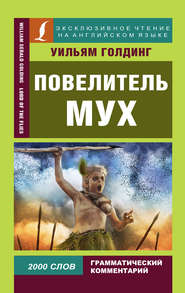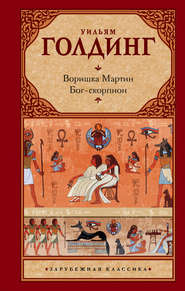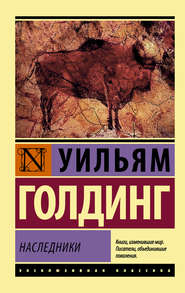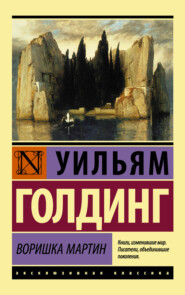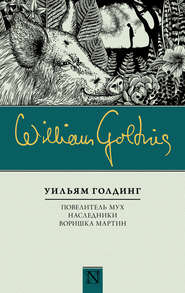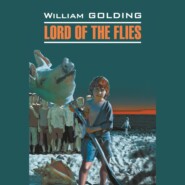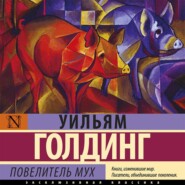По всем вопросам обращайтесь на: info@litportal.ru
(©) 2003-2024.
✖
Повелитель мух / Lord of the Flies
Настройки чтения
Размер шрифта
Высота строк
Поля
“Piggy! Have you got any matches?”
The other boys took up the cry till the mountain rang. Piggy shook his head and came to the pile.
“My! You’ve made a big heap, haven’t you?”
Jack pointed suddenly.
“His specs—use them as burning glasses!”
Piggy was surrounded before he could back away.
“Here—let me go!” His voice rose to a shriek of terror as Jack snatched the glasses off his face. “Mind out! Give ’em back! I can hardly see! You’ll break the conch!”
Ralph elbowed him to the side [10 - elbowed him to the side – отпихнул его локтем]and knelt by the pile.
“Stand out of the light.”
There was pushing and pulling and officious cries. Ralph moved the lenses back and forth, this way and that, till a glossy white image of the declining sun lay on a piece of rotten wood. Almost at once a thin trickle of smoke rose up and made him cough. Jack knelt too and blew gently, so that the smoke drifted away, thickening, and a tiny flame appeared. The flame, nearly invisible at first in that bright sunlight, enveloped a small twig, grew, was enriched with color and reached up to a branch which exploded with a sharp crack. The flame flapped higher and the boys broke into a cheer.
“My specs!” howled Piggy. “Give me my specs!”
Ralph stood away from the pile and put the glasses into Piggy’s groping hands. His voice subsided to a mutter.
“Jus’ blurs, that’s all. Hardly see my hand—”
The boys were dancing. The pile was so rotten, and now so tinder-dry, that whole limbs yielded passionately to the yellow flames that poured upwards and shook a great beard of flame twenty feet in the air. For yards round the fire the heat was like a blow, and the breeze was a river of sparks. Trunks crumbled to white dust.
Ralph shouted.
“More wood! All of you get more wood!”
Life became a race with the fire and the boys scattered through the upper forest. To keep a clean flag of flame flying on the mountain was the immediate end and no one looked further. Even the smallest boys, unless fruit claimed them, brought little pieces of wood and threw them in. The air moved a little faster and became a light wind, so that leeward and windward side were clearly differentiated. On one side the air was cool, but on the other the fire thrust out a savage arm of heat that crinkled hair on the instant. Boys who felt the evening wind on their damp faces paused to enjoy the freshness of it and then found they were exhausted. They flung themselves down in the shadows that lay among the shattered rocks.
The beard of flame diminished quickly; then the pile fell inwards with a soft, cindery sound, and sent a great tree of sparks upwards that leaned away and drifted downwind. The boys lay, panting like dogs.
Ralph raised his head off his forearms.
“That was no good.”
Roger spat efficiently into the hot dust.
“What d’you mean?”
“There wasn’t any smoke. Only flame.”
Piggy had settled himself in a space between two rocks, and sat with the conch on his knees.
“We haven’t made a fire,” he said, “what’s any use. We couldn’t keep a fire like that going, not if we tried.”
“A fat lot you tried,” said Jack contemptuously. “You just sat.”
“We used his specs,” said Simon, smearing a black cheek with his forearm. “He helped that way.”
“I got the conch,” said Piggy indignantly. “You let me speak!”
“The conch doesn’t count on top of the mountain,” said Jack, “so you shut up.”
“I got the conch in my hand.”
“Put on green branches,” said Maurice. “That’s the best way to make smoke.”
“I got the conch—”
Jack turned fiercely.
“You shut up!”
Piggy wilted. Ralph took the conch from him and looked round the circle of boys.
“We’ve got to have special people for looking after the fire. Any day there may be a ship out there”—he waved his arm at the taut wire of the horizon—“and if we have a signal going they’ll come and take us off. And another thing. We ought to have more rules. Where the conch is, that’s a meeting. The same up here as down there.”
They assented. Piggy opened his mouth to speak, caught Jack’s eye and shut it again.
Jack held out his hands for the conch and stood up, holding the delicate thing carefully in his sooty hands.
“I agree with Ralph. We’ve got to have rules and obey them. After all, we’re not savages. We’re English, and the English are best at everything. So we’ve got to do the right things.”
He turned to Ralph.
“Ralph, I’ll split up the choir—my hunters, that is—into groups, and we’ll be responsible for keeping the fire going—”
This generosity brought a spatter of applause from the boys, so that Jack grinned at them, then waved the conch for silence.
“We’ll let the fire burn out now. Who would see smoke at night-time, anyway? And we can start the fire again whenever we like. Altos, you can keep the fire going this week, and trebles the next—”
The assembly assented gravely.
“And we’ll be responsible for keeping a lookout too. If we see a ship out there”—they followed the direction of his bony arm with their eyes—“we’ll put green branches on. Then there’ll be more smoke.”
They gazed intently at the dense blue of the horizon, as if a little silhouette might appear there at any moment. The sun in the west was a drop of burning gold that slid nearer and nearer the sill of the world. All at once they were aware of the evening as the end of light and warmth.
Roger took the conch and looked round at them gloomily.
“I’ve been watching the sea. There hasn’t been the trace of a ship. Perhaps we’ll never be rescued.”
A murmur rose and swept away. Ralph took back the conch.
“I said before we’ll be rescued sometime. We’ve just got to wait, that’s all.”
The other boys took up the cry till the mountain rang. Piggy shook his head and came to the pile.
“My! You’ve made a big heap, haven’t you?”
Jack pointed suddenly.
“His specs—use them as burning glasses!”
Piggy was surrounded before he could back away.
“Here—let me go!” His voice rose to a shriek of terror as Jack snatched the glasses off his face. “Mind out! Give ’em back! I can hardly see! You’ll break the conch!”
Ralph elbowed him to the side [10 - elbowed him to the side – отпихнул его локтем]and knelt by the pile.
“Stand out of the light.”
There was pushing and pulling and officious cries. Ralph moved the lenses back and forth, this way and that, till a glossy white image of the declining sun lay on a piece of rotten wood. Almost at once a thin trickle of smoke rose up and made him cough. Jack knelt too and blew gently, so that the smoke drifted away, thickening, and a tiny flame appeared. The flame, nearly invisible at first in that bright sunlight, enveloped a small twig, grew, was enriched with color and reached up to a branch which exploded with a sharp crack. The flame flapped higher and the boys broke into a cheer.
“My specs!” howled Piggy. “Give me my specs!”
Ralph stood away from the pile and put the glasses into Piggy’s groping hands. His voice subsided to a mutter.
“Jus’ blurs, that’s all. Hardly see my hand—”
The boys were dancing. The pile was so rotten, and now so tinder-dry, that whole limbs yielded passionately to the yellow flames that poured upwards and shook a great beard of flame twenty feet in the air. For yards round the fire the heat was like a blow, and the breeze was a river of sparks. Trunks crumbled to white dust.
Ralph shouted.
“More wood! All of you get more wood!”
Life became a race with the fire and the boys scattered through the upper forest. To keep a clean flag of flame flying on the mountain was the immediate end and no one looked further. Even the smallest boys, unless fruit claimed them, brought little pieces of wood and threw them in. The air moved a little faster and became a light wind, so that leeward and windward side were clearly differentiated. On one side the air was cool, but on the other the fire thrust out a savage arm of heat that crinkled hair on the instant. Boys who felt the evening wind on their damp faces paused to enjoy the freshness of it and then found they were exhausted. They flung themselves down in the shadows that lay among the shattered rocks.
The beard of flame diminished quickly; then the pile fell inwards with a soft, cindery sound, and sent a great tree of sparks upwards that leaned away and drifted downwind. The boys lay, panting like dogs.
Ralph raised his head off his forearms.
“That was no good.”
Roger spat efficiently into the hot dust.
“What d’you mean?”
“There wasn’t any smoke. Only flame.”
Piggy had settled himself in a space between two rocks, and sat with the conch on his knees.
“We haven’t made a fire,” he said, “what’s any use. We couldn’t keep a fire like that going, not if we tried.”
“A fat lot you tried,” said Jack contemptuously. “You just sat.”
“We used his specs,” said Simon, smearing a black cheek with his forearm. “He helped that way.”
“I got the conch,” said Piggy indignantly. “You let me speak!”
“The conch doesn’t count on top of the mountain,” said Jack, “so you shut up.”
“I got the conch in my hand.”
“Put on green branches,” said Maurice. “That’s the best way to make smoke.”
“I got the conch—”
Jack turned fiercely.
“You shut up!”
Piggy wilted. Ralph took the conch from him and looked round the circle of boys.
“We’ve got to have special people for looking after the fire. Any day there may be a ship out there”—he waved his arm at the taut wire of the horizon—“and if we have a signal going they’ll come and take us off. And another thing. We ought to have more rules. Where the conch is, that’s a meeting. The same up here as down there.”
They assented. Piggy opened his mouth to speak, caught Jack’s eye and shut it again.
Jack held out his hands for the conch and stood up, holding the delicate thing carefully in his sooty hands.
“I agree with Ralph. We’ve got to have rules and obey them. After all, we’re not savages. We’re English, and the English are best at everything. So we’ve got to do the right things.”
He turned to Ralph.
“Ralph, I’ll split up the choir—my hunters, that is—into groups, and we’ll be responsible for keeping the fire going—”
This generosity brought a spatter of applause from the boys, so that Jack grinned at them, then waved the conch for silence.
“We’ll let the fire burn out now. Who would see smoke at night-time, anyway? And we can start the fire again whenever we like. Altos, you can keep the fire going this week, and trebles the next—”
The assembly assented gravely.
“And we’ll be responsible for keeping a lookout too. If we see a ship out there”—they followed the direction of his bony arm with their eyes—“we’ll put green branches on. Then there’ll be more smoke.”
They gazed intently at the dense blue of the horizon, as if a little silhouette might appear there at any moment. The sun in the west was a drop of burning gold that slid nearer and nearer the sill of the world. All at once they were aware of the evening as the end of light and warmth.
Roger took the conch and looked round at them gloomily.
“I’ve been watching the sea. There hasn’t been the trace of a ship. Perhaps we’ll never be rescued.”
A murmur rose and swept away. Ralph took back the conch.
“I said before we’ll be rescued sometime. We’ve just got to wait, that’s all.”






